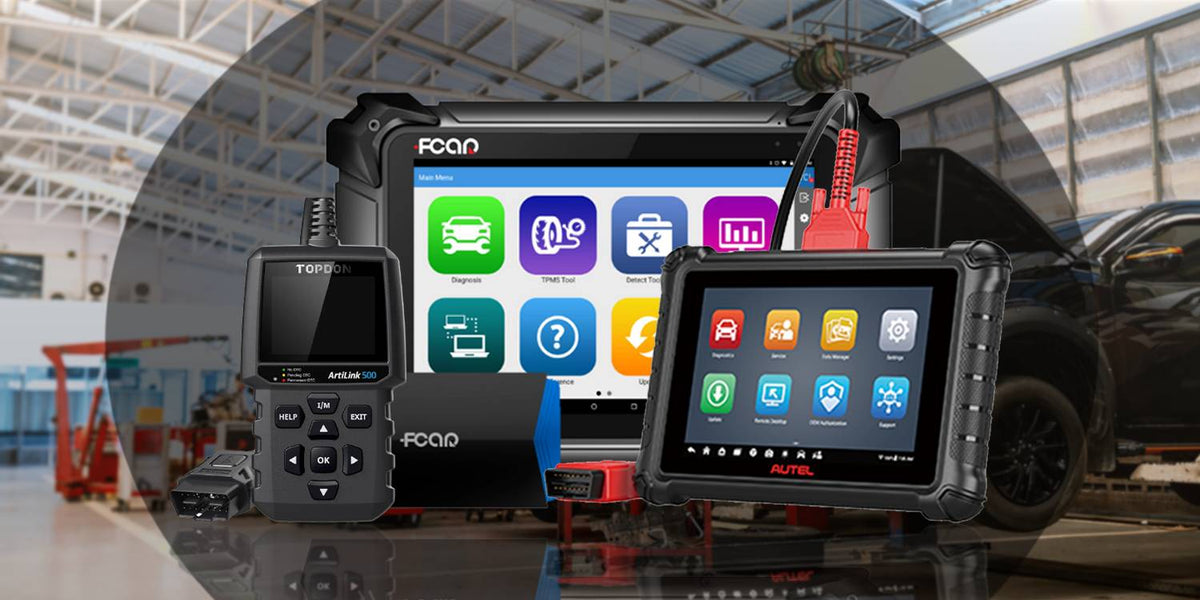
Best Automotive Scan Tool: How to Choose the Right Diagnostic Tool for Your Workshop
|
|
Time to read 6 min
|
|
Time to read 6 min
In today’s automotive world, vehicles are becoming more complex with every model year. From advanced driver-assistance systems (ADAS) to hybrid and electric powertrains, modern cars require more than just a wrench to diagnose and repair effectively. That’s where a professional automotive scan tool comes into play.
Whether you’re running a small independent garage or a full-scale workshop, choosing the right diagnostic tool is crucial. The right scan tool not only saves time but also boosts customer satisfaction and increases your shop’s profitability. But with so many options on the market, how do you choose the best diagnostic scan tool for your needs?
Table of Content
OBD2 Scanners are simple, handheld devices that read and clear trouble codes from a vehicle’s engine control unit (ECU). Perfect for quick checks or for DIY enthusiasts.
A step up from basic code readers, these tools often include additional functions like live data streaming and basic system diagnostics. These scan tools are ideal for small workshops or hobbyists.
Further Readings
These are comprehensive systems designed for full-service workshops. They offer advanced features like bi-directional control, special functions (e.g. DPF regeneration, steering angle calibration), and extensive system coverage across multiple vehicle brands.
When buying scan tools, you will get what you pay for. Professional-scan tools are a no-brainer for professional workshops or technicians, but may be overkill for DIYers and hobbyists.
If your workshop services trucks, buses, or machinery, you’ll need a scan tool designed specifically for heavy-duty vehicles. These tools typically include protocols for J1939 and J1708 communication standards.
Does the tool cover all the makes and models you work on regularly? If you service both passenger vehicles and light trucks or even heavy equipment, you’ll need a tool with wide-ranging coverage.
Beyond reading engine codes, a good professional scanner should diagnose ABS, airbags, transmission, body control modules, and more.
Depending on your shop’s focus, you may need a scanner that supports special functions such as:
Diesel Particulate Filter (DPF) regeneration
Injector coding
Throttle body calibration
Electronic parking brake reset
Battery registration
Consider whether you prefer a handheld device with physical buttons or a modern tablet-based interface with a touchscreen. Android-based tablets tend to offer more intuitive navigation and flexibility.
Many modern scan tools offer wireless Bluetooth or Wi-Fi connectivity for convenience and mobility around the shop, compared to traditional cable-connected models.
Look for tools that include regular software updates to keep up with evolving vehicle technologies. Be aware of whether updates come free or as part of a paid subscription.
While it’s tempting to choose a cheaper option, investing in a professional-grade tool will often save money in the long run by reducing diagnostic times and minimizing incorrect diagnoses.
Focusing solely on price: Cheap tools may lack the functionality needed for professional-grade diagnostics.
Not future-proofing your investment: Consider emerging technologies like EVs and ADAS when selecting a tool.
Overlooking after-sales service: Reliable customer support and warranty are critical when you encounter technical issues.
Here are some trusted brands that consistently deliver reliable, workshop-grade scan tools:
Autel – Known for wide vehicle coverage and advanced diagnostics.
FCAR – Strong focus on heavy-duty and commercial vehicle diagnostics, while also offering comprehensive passenger vehicle coverage.
Topdon – Innovative scan tools with excellent value and growing global recognition.
ThinkCAR – Modern diagnostic solutions with a focus on wireless technology and user-friendly interfaces.
Conclusion
The right automotive scan tool is a game-changer for your workshop. It enhances your team’s ability to diagnose faults accurately, increases workflow efficiency, and boosts your shop’s professional reputation. Take the time to consider your workshop’s needs and invest in a tool that will grow with your business.
Need expert advice on the right scan tool for your workshop? Explore our full range of diagnostic equipment here.
Further Readings
An automotive scan tool is used to read and clear diagnostic trouble codes (DTCs) from a vehicle's computer systems. Professional models can also perform advanced diagnostics, system tests, and service functions such as DPF regeneration, injector coding, and brake resets.
Most basic OBD2 code readers work on vehicles made from 1996 onwards (in the US) or 2001+ petrol and 2004+ diesel vehicles (in Australia and Europe). However, they are limited to engine-related codes and do not access systems like ABS, SRS, or transmission modules.
Many professional-grade scan tools include 1-3 years of free updates. After that, a subscription is often needed for ongoing software updates to cover new models and advanced functions. Always check with the manufacturer.
Consumer-grade tools offer basic to intermediate diagnostics like live data and limited system coverage (ABS, SRS). Professional tools provide full-system diagnostics, special functions, bi-directional controls, and broader vehicle compatibility.
No, heavy-duty scan tools are designed specifically for commercial vehicles, such as trucks and buses. If you only service passenger vehicles, a professional automotive scan tool for light-duty cars is sufficient.
Wireless tools offer greater mobility and convenience around the workshop, while wired tools may provide slightly faster communication and don’t rely on battery power. It depends on your workflow and shop preferences.
